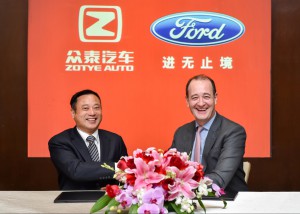
Ying Jianren, board director of Zotye Auto, left, and Peter Fleet, president, Ford Asia Pacific, signed the new joint venture agreement.
Even as President Donald Trump landed in Beijing to talk about North Korea and other key issues such as trade, Ford Motor Co. announced it reached agreement with a Chinese partner to build a new line of electric vehicles for the burgeoning Chinese car market.
The new agreement with the Chinese company Zotye established a new venture called Zotye Ford Automobile Co. Ltd., a 50:50 joint venture that will offer affordable all-electric vehicles for consumers in China under a new indigenous brand.
China has long pressed western carmakers to establish new brands in China. General Motors created the Baojun brand in 2010 specifically for the Chinese market. Ford, however, has held off until now.
The agreement was signed in Beijing by Peter Fleet, Ford group vice president and president, Ford Asia Pacific, and Ying Jianren, chairman of Tech-New Group Ltd. and board director of Zotye Auto. The partners in the new joint venture will put up a combined investment of $756 million.
(BMW talking with Great Wall Motors about EV deal in China. For the story, Click Here.)
“We are delighted to have signed this joint venture agreement with Zotye to form our third joint venture automotive company in China. Subject to regulatory approval, Zotye Ford will introduce a new brand family of small all-electric vehicles,” Fleet said.
“We will be exploring innovative vehicle connectivity and mobility service solutions for a new generation of young city-dwelling Chinese customers.”
Ford’s not alone in this strategy. With the Chinese government pushing hard for a shift to EVs, including a potential ban of all gasoline- and diesel-powered vehicles by 2030, automakers have been scrambling to pair up with Chinese makers to get a foothold in the EV market there.
BMW, Mercedes-Benz, General Motors, Volkswagen and others have all recently announced plans or new partnership with Chinese companies to build EVs in the country.
EV demand could surge even more sharply if battery prices fall faster than anticipated – which Boston Consulting Group partner Xavier Mosquet acknowledged during a recent event is quite possible. When BCG did its previous electrification study in 2010 the price of lithium-ion battery technology was around $670 per kilowatt-hour.
Today, that’s as low as $150 – even as batteries have become more energy dense, quicker to charge and more reliable. Within about five years, however, BCG forecasts a price of around $70 a kWh. To put that into perspective, the batteries in the Chevrolet Bolt EV would have cost around $40,000 in 2010 but will drop to around $4,000 by the early 2020s, by BCG’s account.
(Click Here for details about China ramping up pressure on automakers for more EVs.)
Pending regulatory approval, the new JV will design, build, market and distribute all-electric passenger vehicles for China. The new venture will build upon Ford’s China electrification strategy that calls for at least 70% of Ford-branded vehicles sold in the country to offer electrified powertrain options by 2025.
Zotye Ford plans to build a dedicated product research and development center as well as its own sales and services network. A new manufacturing plant for the JV will be constructed in Zhejiang Province. The all-electric vehicles produced by the JV will be sold under a new Chinese brand designed to meet Chinese consumers’ aspirations for electric vehicles.
With the new JV will expand Ford’s footprint in China. Ford already operates vehicle joint ventures with Changan Ford Automobile Corp. Ltd. and Jiangling Motors Corp.
In addition to the new JV, Ford and Zotye will explore offering mobility services to consumers in China as local demand for such solutions continues to grow.
Through this new JV, Ford commits to actively support the advancement of a more environmentally sustainable auto industry in China through local research and development as well as domestic production of all-electric vehicles.
Zotye Auto is a pioneer in the Chinese all-electric vehicle segment. It is the market leader in China’s all-electric small vehicle segment and sold more than 22,500 all-electric vehicles year-to-date through October, representing a growth of over 14% year-over-year. The JV will benefit from Zotye’s expertise in designing and commercializing EVs in China, and Ford’s global product development and technology capabilities.
(To see why as many as half of the vehicles on U.S. roads will be EVs by 2030, Click Here.)
“This is an important day for Zotye as we partner with Ford to help advance the growth of the Chinese auto industry,” said Zotye’s Ying. “We will work closely together to help meet Chinese consumers’ growing demand for electric vehicles.”

Dumb move by Ford. It appears the chi-coms are allowing their EV initiative to proceed without a Chinese partner so why would Ford want a partner much less a little league company like Zotye?